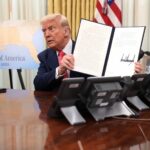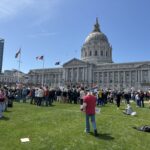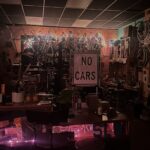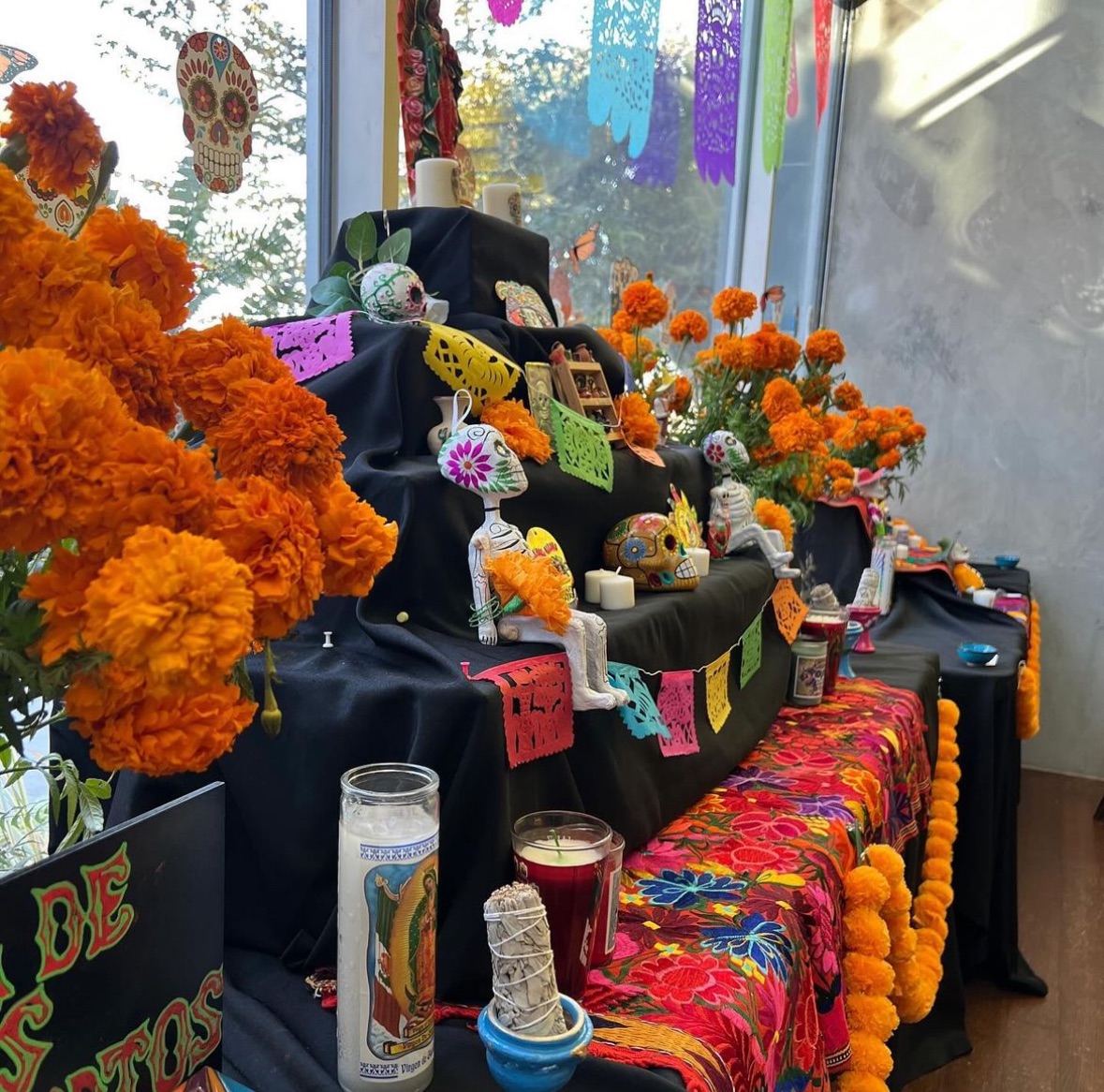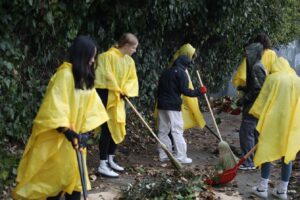As the Israel-Hamas war in Gaza rapidly unfolds, schools are faced with the incredibly complex question: How do we appropriately respond to ensure all community members feel seen and heard? As many members of the Lick-Wilmerding High School community are directly impacted, the question has become: How do we center collective humanity and student safety while providing space for civil discourse?
As one of the world’s longest-standing disputes, the Israeli-Palestinian conflict has continued for over 75 years. On November 15th, 2023, BBC reported: “The Palestinian militant group Hamas launched an unprecedented assault on Israel on 7 October, with hundreds of gunmen infiltrating communities near the Gaza Strip. About 1,200 people were killed, while the Israeli military says more than 200 soldiers and civilians, including women and children, were taken to Gaza as hostages. More than 14,000 Palestinians in Gaza have been killed in air and artillery strikes carried out by the Israeli military in response, according to the Hamas-run health ministry in Gaza.”
When incredibly violent and politically divisive situations arise, academic institutions are put in the challenging position of addressing the worldwide conflicts with students. Creating space for discussion nurtures students to be global, compassionate citizens, but staying silent disregards the lived experience of individuals. The LWHS community is made up of a diverse group of students and faculty, many of whom identify as Israeli, Palestinian, Arab, Jewish and Muslim, further deepening the “very real connection that many students have to this war,” said Raj Mundra, Head of School.
Following the events of October 7th, students had both Monday and Tuesday off for Indigenous Peoples’ Day and a faculty inservice day. On Tuesday, October 10th, the faculty on campus addressed the conflict for the first time, with the help of the senior administration team. “We came together and shared our thoughts about the horror that was unfolding,” Mundra said.
During this meeting, the senior administration team made the executive decision to interrupt the school schedule on Wednesday, October 11th, for a community-wide assembly. That Tuesday afternoon, Mundra sent out an email to all community members, sharing the schedule change and a message about the war. “One of the things I love about Lick is that we are a diverse community. Indeed, we have a number of people that have strong social, political and familial ties to both contexts involved in this heartbreaking situation. As a school, we are committed to holding all of these complexities while also ensuring a safe and supportive learning environment for all students, particularly those directly affected,” Mundra wrote. “Tomorrow, we will take time to gather as a community to acknowledge this tragedy and to share opportunities with the students to gather in community.”
“We were very intentional in that a lot of our orientation was to try and center humanity and also student experience,” Matthew Oakland, Director of Student Inclusion, said. During the community meeting, Mundra spoke not only about the violence that was unfolding and the importance of seeing common humanity, but also condemned Hamas and shared the school’s desire to provide a space for support, being very clear that the institution was not taking a side.
In addition to this statement, all community members took part in a moment of silence to honor the many people who had lost their lives to the war in the Middle East, calling attention to the students, faculty and families who knew of loved ones who could or were being impacted.
Some students felt that the community meeting format did not facilitate dialogue. “It didn’t support flourishing conservations,” Zainab Ansary ’25, Student Inclusion Chair and co-leader of South Asian Middle Eastern Club (SAME), said.
The administration knew that conversation would be incredibly difficult to facilitate in a whole school setting, so this meeting was followed by an opt-in, safe session for students to share their authentic feelings and reactions in a smaller group.
“There was a lot of kindness and support that was displayed [in those spaces],” Mundra said. “I learned that the school does a good job of centering those who are most vulnerable and holding the whole community in care.” In the week that followed, there were also open classrooms facilitated by faculty dedicated to healing, conversation and providing affinity to those students who needed it.
As these conversations arose, student organizations worked alongside community leaders to think through the nuances of opening these spaces. Both students and faculty saw these conversations as vital, but dialogue continued on how to foster safety and shared humanity at the core, while allowing for the political discourse that is central to the LWHS educational experience.
Both SAME and the Jewish Student Union (JSU) are active student organizations at LWHS. Following October 7th, JSU hosted healing spaces for students to have honest, raw conversations, all with the goal of creating affinity and providing an area for the conversations that needed to be had. In these conversations, students shared that they did not feel as safe on campus as they once did and were – in many cases – unsure how they identified with the war on a more personal level and further, unsure of how to talk about it.
Similarly, the SAME leaders had concerns about the response that students would have to whatever statement they decided to make. “[At Lick-Wilmerding], the Middle Easterners are a minority within a minority,” Ansary said. While LWHS as a school is incredibly diverse on many fronts, the Middle Eastern student population is significantly lower than other identity groups. “Every time there is a conflict in the Middle East, any view that SAME could have or publish would have a lot of pushback initially. People are very quick to critique one side,” she said.
But many of these critiques are a result of not fully understanding the history and complexities of the situation. “At its core, education is the basis for the ability to have these discussions,” Oakland said. Community-wide education about the war in the Middle East is at the forefront of the issue, so students are properly equipped to engage with peers, and share relevant, supported opinions. “Most students are afraid to say something wrong for fear that they will offend their peers,” Manu Rapaport ’25, co-leader of JSU, said. “Anything I could say would automatically brand two billion people,” Ansary said. As students question how to converse with peers, schools grapple with the burden of finding a way to provide an unbiased education about these issues.
This concern, coupled with a lack of contextual understanding, results in many students’ hesitations to comment at all. “You hear a lot of people saying, ‘I can’t have an opinion because I’m not educated enough,’” Ansary said. LWHS is taking a unique approach to combat this by designing opportunities that will hopefully facilitate unbiased education, and therefore honest, thoughtful discussion. “We hope to help students learn how to think rather than what to think,” Mundra said.
On Wednesday, November 1st, Kate Wiley, Dean of Teaching and Learning and History teacher, held an informational lunch session: The Middle East Conflict—A History 101. “She is spearheading the charge on an education front,” Oakland said. The informational session was received very well by the community, and students are looking forward to more similar opportunities. “I’ve never seen someone teach history that well…I think students came away from it not having more clarity, but actually having more questions – which in the discussion of Israel and Palestine, is the best thing that can happen,” Rapaport said.
“As [LWHS] continues to think about short, medium and long term ways to address the conflict, we’ve been thinking about doing an interfaith panel,” Oakland said. “While some feel ill-equipped to have those conversations and check in on friends, we hope that this begins to create modeling of what the civic discourse and conversations will look like for us as a school.”
While the tensions between students and clubs alike have remained high during the conflict, there is a mutual understanding for the importance of coming together during moments of great divide. “The first priority is making sure this war doesn’t come to Lick,” Rapaport said.
Latinx Unidos (LU) –another student-run affinity organization – brought JSU and SAME together this past month with their annual Ofrenda display near the lobby. On a chalkboard next to the Ofrenda read the statement, “the Ofrenda is a carefully decorated altar that serves as a tribute to deceased family members and friends. A physical space that allows the living to connect with the spirits of the departed, welcoming them back to the world of the living for a brief time.” This year, knowing that many students were grieving family members and friends who had been lost to this war, LU decided to invite both JSU and SAME to participate in the tradition, and create a space for those who are mourning the loss of loved ones. “The Ofrenda with LU was a really enjoyable experience and was a great opportunity to get to learn about other cultures, and come together as student organizations during this time,” Rapaport said.
“One frame that’s been helpful is to not see the war as a problem to be solved by our Lick-Wilmerding community, but rather a dilemma that we are learning to cope with,” Mundra said. As a community, it is important to name the complexities, difficulties and emotions of this situation, but to be also conscious of our school’s core values – to promote student engagement through intentional discussion.”
